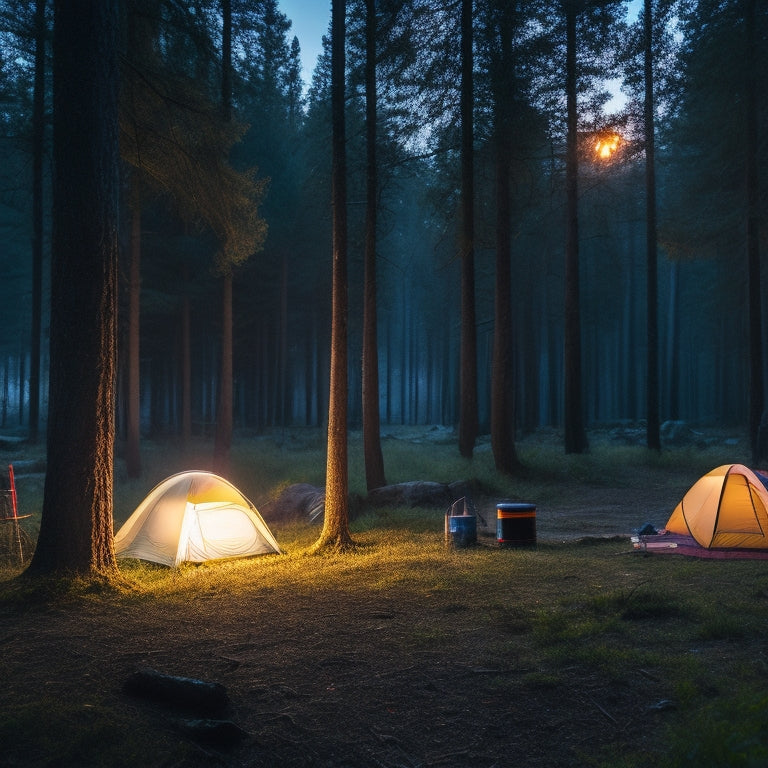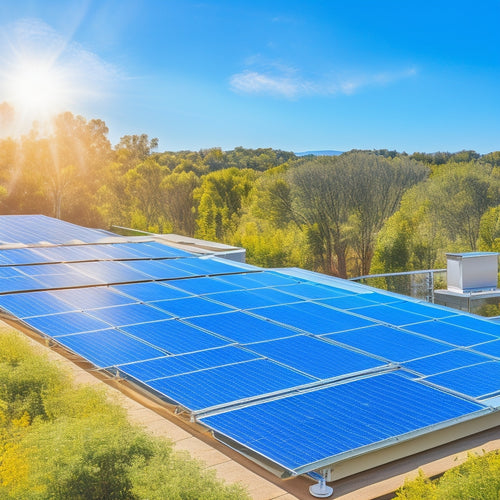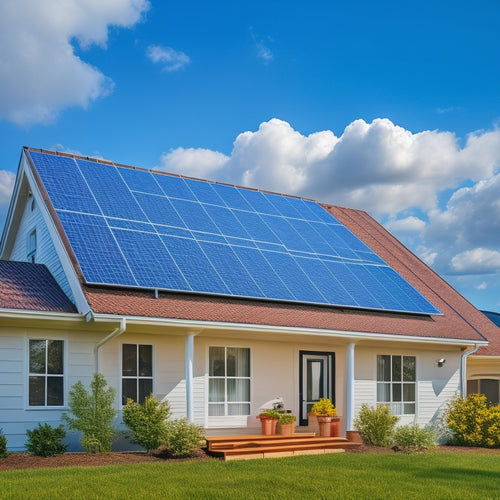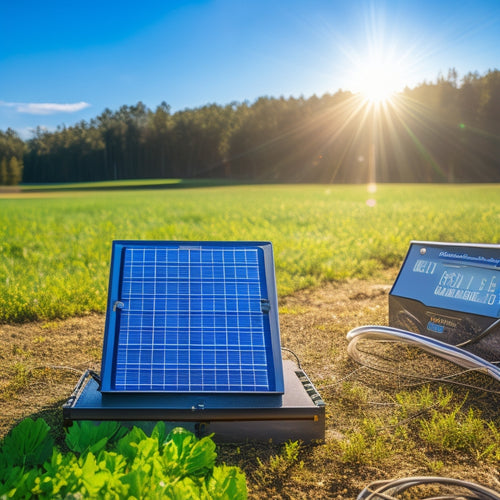
Portable Energy Storage for Camping Made Easy
Share
When choosing a portable energy storage solution for camping, you'll want to evaluate factors like battery capacity, maintenance, and temperature management to guarantee reliable power. Look for high energy density batteries with a good power-to-weight ratio and assess your camping needs to determine the right capacity. Reflect on a portable power station with lithium batteries, USB, DC, and AC outlets, and advanced features like MPPT charge controllers. Then, select efficient solar panels with high efficiency, weather-resistant materials, and a low temperature coefficient. By understanding your energy needs and choosing the right gear, you'll be well on your way to a hassle-free camping trip - and there's more to investigate to facilitate a seamless experience.
Key Takeaways
- Evaluate battery capacity in watt-hours (Wh) to balance energy duration with weight and size considerations for camping needs.
- Choose high-energy-density lithium batteries with regular maintenance and temperature management for optimal performance and longevity.
- Assess camping energy needs by calculating total daily energy consumption and specifying required energy storage capacity, voltage, and battery type.
- Select efficient solar panels with high energy conversion rates, weather-resistant materials, and durable construction for consistent power generation.
- Pack and transport energy storage essentials safely and conveniently in protective cases and bags, ensuring easy access during camping trips.
Choosing the Right Battery
When venturing into the great outdoors, you often find yourself relying on portable energy storage to power your camping gear.
When choosing the right battery, you need to evaluate two important factors: battery capacity and weight considerations. Battery capacity, measured in watt-hours (Wh), determines how long your gear will stay powered. A higher capacity means more energy storage, but it also increases the battery's weight and size.
Weight considerations are significant, as you'll be carrying the battery with you. It's important to maintain your battery's health through regular maintenance frequency and assess the impact of temperature on efficiency and lifespan.
Look for batteries with high energy density, which pack more power per pound. By balancing capacity and weight, you'll find a battery that meets your camping needs without weighing you down.
Portable Power Station Options
You're likely considering portable power stations to complement your camping battery. These versatile units offer a convenient and quiet alternative to traditional generators.
They're fundamentally batteries with built-in inverters, allowing you to charge devices and power appliances directly. When selecting a portable power station, consider the following key factors:
-
Capacity: Look for a unit with a sufficient capacity to meet your energy needs, measured in watt-hours (Wh). Many solar battery systems, such as the Goal Zero Yeti 1000, feature advanced tech features like MPPT charge controllers and Battery Management Systems (BMS) to improve energy management advanced tech features.
-
Lithium batteries: Opt for a station with lithium batteries for their high energy density and long lifespan. Portable designs, like the EcoFlow River, enable easy transport and rugged construction protects against water and dust exposure.
-
Ports and outlets: Verify the station has the right combination of USB, DC, and AC outlets to support your devices.
- Weight and portability: Choose a lightweight and compact station that's easy to transport.
Camping Energy Needs Assessment
Three days of camping in the wilderness require careful planning, and evaluating your energy needs is an important step in preparing for your expedition.
You'll need to evaluate your energy consumption and power requirements to guarantee you have a reliable source of power. Start by making a list of the devices you plan to bring, including their wattage and average usage time.
Calculate your total energy consumption per day, considering factors like charging your phone, powering a portable fridge, and running lights. This will give you a clear understanding of your power requirements, helping you choose the right portable energy storage solution for your camping trip.
It's vital to conduct an energy audit to identify areas of inefficiency and improve your overall energy management.
Additionally, specifying required energy storage capacity, voltage, and battery type will help you make an informed decision.
Accurately evaluating your energy needs will guarantee you stay powered up and comfortable throughout your excursion.
Selecting the Best Solar Panels
When selecting the best solar panels for your portable energy storage system, you'll want to contemplate two critical factors: solar panel efficiency and panel durability.
Efficiency determines how much energy your panels can generate per hour of sunlight, while durability affects their ability to withstand harsh outdoor conditions.
Solar Panel Efficiency
During your search for the ideal portable energy storage solution for camping, selecting solar panels with high efficiency is essential. Efficiency measures how well a solar panel converts sunlight into electrical energy. A higher efficiency rating means more power output per unit area, making it ideal for camping where space is limited.
When choosing solar panels, consider the following factors that impact efficiency:
-
Solar panel types: Monocrystalline silicon panels are more efficient than polycrystalline or thin-film panels.
-
Cell configuration: Panels with a higher number of cells and a more efficient cell configuration produce more power.
-
Temperature coefficient: Look for panels with a low temperature coefficient to minimize power loss in hot temperatures.
- Installation: Proper installation, including angle and orientation, also affects efficiency.
Panel Durability Matters
Your portable energy storage system for camping is only as reliable as its solar panels, making panel durability a critical consideration in your selection process.
You need solar panels that can withstand the outdoor elements, so it's crucial to examine the panel materials and construction. Look for panels with weather-resistant coatings and frames that can handle rough handling and harsh environmental conditions.
A durable solar panel will guarantee your system continues to generate power even in inclement weather. Assess the panel's IP rating, which indicates its level of protection against solid objects and water. A higher rating means better protection.
Battery Maintenance and Safety
Properly maintaining your portable energy storage devices is essential to assure they perform at their best and safely during camping trips.
You'll want to extend your battery lifespan and guarantee safety precautions are in place. To do so, follow these guidelines:
-
Store your batteries in a cool, dry place away from metal objects to prevent damage and short-circuiting.
-
Avoid overcharging or undercharging, as this can reduce your battery's overall lifespan.
-
Clean the terminals and connectors regularly to prevent corrosion and maintain a strong connection.
- Monitor your battery's state of charge and health to identify any potential issues before they become major problems.
Packing and Transporting Essentials
As you prepare for your camping trip, it's essential to pack and transport your portable energy storage devices efficiently to guarantee they remain safe and functional throughout your expedition. You'll want to take into account packing techniques that protect your gear from damage and transporting them in a way that assures they're easily accessible when you need them.
| Device | Packing Techniques | Transporting Gear |
|---|---|---|
| Portable Power Bank | Wrap in soft cloth, store in protective case | Store in backpack or bag with padding |
| Solar Panel | Fold and secure with straps, store in dedicated bag | Attach to backpack or carry by hand |
| Battery Pack | Place in hardshell case, store in dry area | Store in waterproof container or bag |
| Inverter | Wrap in foam, store in protective box | Store in dedicated compartment in vehicle |
Frequently Asked Questions
Can I Use a Portable Energy Storage System at High Altitudes?
You can use a portable energy storage system at high altitudes, but you'll notice a slight decline in high altitude performance due to lower air pressure, which affects battery efficiency, requiring more power to maintain the same output.
Are Portable Power Stations Suitable for Powering Small Appliances?
You're torn between rugged camping gear and delicate appliances, but fear not! Portable power stations are designed to bridge this gap, offering varying battery capacities to guarantee seamless compatibility with your small appliances, so you can brew coffee or power a mini fridge with ease.
Do I Need a Separate Inverter for My Energy Storage System?
You'll likely need a separate inverter for your energy storage system, depending on the inverter type and energy efficiency requirements; some systems integrate inverters, but others require a standalone unit to optimize performance and minimize energy loss.
Can I Charge My Portable Energy Storage System From a Wall Outlet?
"Lighting the way" to convenient charging, you'll be pleased to know you can charge your portable energy storage system from a wall outlet, offering a hassle-free charging option alongside other charging options, making it a versatile power solution.
Are There Any Portable Energy Storage Systems With Built-In Lights?
You'll find portable energy storage systems with built-in lights, offering built-in illumination for camping convenience. These systems, like Goal Zero's Torch 250 or Anker's Powerhouse 200, feature LED lights, making it easy to steer or read in the dark while camping.
Related Posts
-

What Types of Solar Energy Devices Are Available
You'll find several types of solar energy devices available today, each customized to different energy needs. Photovo...
-

Cost of Solar Panel Installation
You can expect to pay between $15,000 and $30,000 or more for a typical solar panel installation, depending on the sy...
-

Choosing the Right Solar Power Charge Controller
Choosing the right solar power charge controller is crucial for maximizing energy efficiency and extending battery li...


